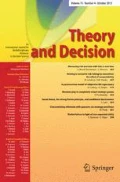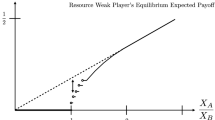Abstract
This paper reports an experimental investigation of the hypothesis that in coordination games, players draw on shared concepts of salience to identify ‘focal points’ on which they can coordinate. The experiment involves games in which equilibria can be distinguished from one another only in terms of the way strategies are labelled. The games are designed to test a number of specific hypotheses about the determinants of salience. These hypotheses are generally confirmed by the results of the experiment.
Similar content being viewed by others
References
Bacharach, M.: 1991, ‘Games with Concept-Sensitive Strategy Spaces’. Paper presented at International Conference on Game Theory, Florence; forthcoming in K. Binmoreet al. (Eds.),Frontiers of Game Theory, Cambridge, Mass.: MIT Press.
Cooper, R. W., DeJong, D. V., Forsythe, R. and Ross, T. W.: 1990, ‘Selection Criteria in Coordination Games’,American Economic Review 80, 218–233.
Crawford, V.: 1991, ‘An “Evolutionary” Interpretation of Van Huyck, Battalio, and Beil's Experimental Results on Coordination’,Games and Economic Behavior 3, 25–29.
Crawford, V. and Haller, H.: 1990, ‘Learning How to Cooperate: Optimal Play in Repeated Coordination Games’,Econometrica 58, 571–595.
Gauthier, D.: 1975, ‘Coordination’,Dialogue 14, 195–221.
Gilbert, M.: 1989a, ‘Rationality and Salience’,Philosophical Studies 57, 61–77.
Gilbert, M.: 1989b,On Social Facts, Routledge, London.
Harsanyi, J. C. and Selten, R.: 1988,A General Theory of Equilibrium Selection in Games, MIT Press, Cambridge, Mass.
Heal, J.: 1978, ‘Common Knowledge’,Philosophical Quarterly 28, 116–131.
Hume, D.: 1740,A Treatise of Human Nature, page references to 1978 edition published by Oxford University Press, Oxford.
Kahneman, D., Knetsch, J. and Thaler, R.: 1986, ‘Fairness and the Assumptions of Economics’,Journal of Business 59, s285-s300.
Kandori, M., Mailath, G. J. and Rob, R.: ‘Learning, Mutation, and Long Run Equilibria in Games’,Econometrica 61, 29–56.
Kreps, D. M.: 1990,A Course in Microeconomic Theory, Harvester Wheatsheaf, London.
Lewis, D.: 1969,Convention: A Philosophical Study, Harvard University Press, Cambridge, Mass.
Ponssard, J.-P.: 1990, ‘Self Enforceable Paths in Extensive Form Games’,Theory and Decision 29, 69–83.
Roth, A. and Murnighan, M.: 1982, ‘The Role of Information in Bargaining: An Experimental Study’,Econometrica 50, 1123–1142.
Schelling, T.: 1960,The Strategy of Conflict, Harvard University Press, Cambridge, Mass.
Sugden, R.: 1986,The Economics of Rights, Cooperation and Welfare, Basil Blackwell, Oxford.
Sugden, R.: 1991, ‘Rational Choice: A Survey of Contributions from Economics and Philosophy’,Economic Journal 101, 751–785.
Sugden, R.: 1993, ‘Thinking as a Team: Towards an Explanation of Nonselfish Behavior’,Social Philosophy and Policy 10, 69–89.
Van Damme, E.: ‘Stable Equilibria and Forward Induction’,Journal of Economic Theory 48, 476–496.
Van Huyck, J., Battalio, R. and Beil, R.: 1990, ‘Tacit Coordination Games, Strategic Uncertainty, and Coordination Failure’,American Economic Review 80, 234–248.
Young, H. P.: ‘The Evolution of Conventions’,Econometrica 61, 57–84.
Author information
Authors and Affiliations
Rights and permissions
About this article
Cite this article
Mehta, J., Starmer, C. & Sugden, R. Focal points in pure coordination games: An experimental investigation. Theor Decis 36, 163–185 (1994). https://doi.org/10.1007/BF01079211
Issue Date:
DOI: https://doi.org/10.1007/BF01079211




